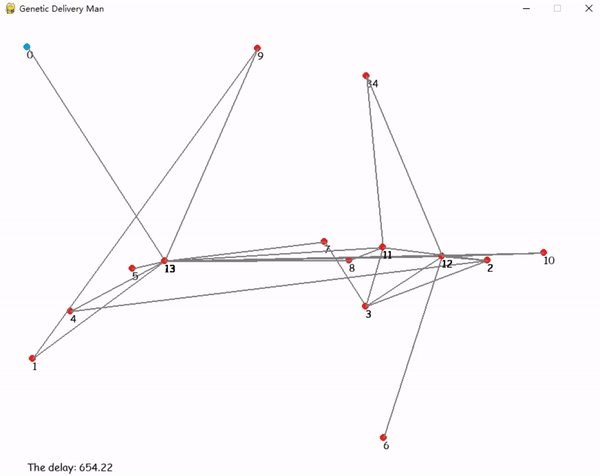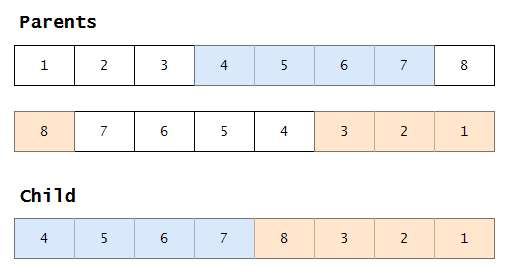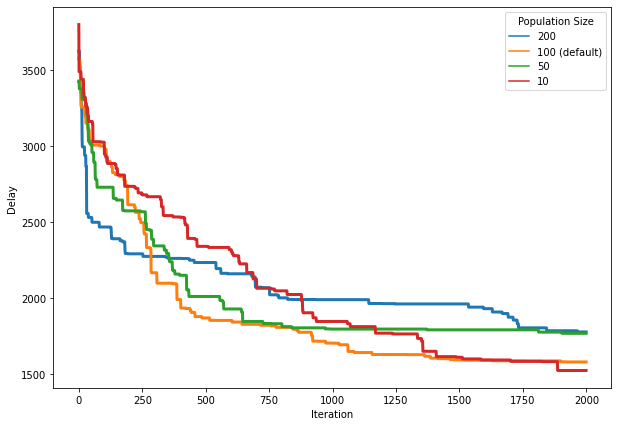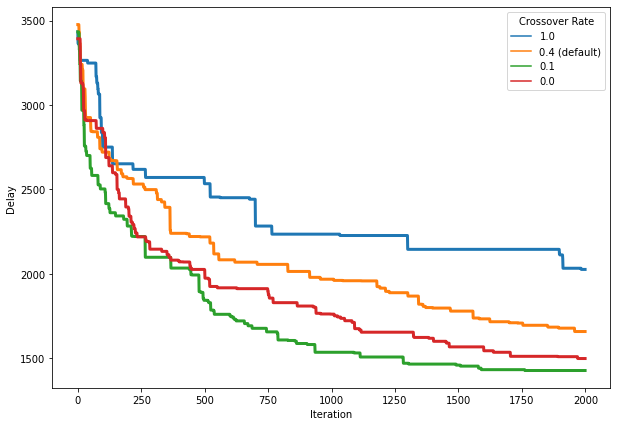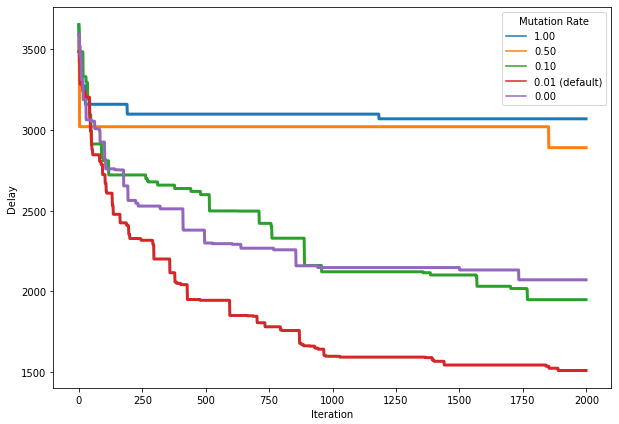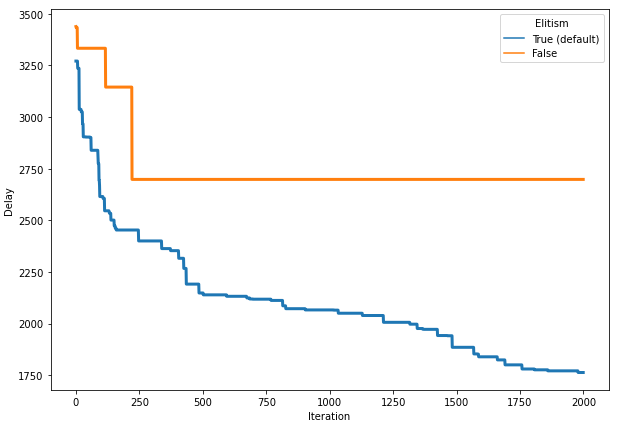This project uses a genetic model to solve a derivative version of the traveling salesman problem with time consideration.
A delivery man needs to deliver some goods to customers in different cities. Every customer has been waiting for a while and has a time limit on the delivery. If the time needed is greater than a customer's limit, the exceeded is treated as a delay.
The genetic model needs to find a route that minimizes the total delay time for all customers.
-
Install Python 3.10.
-
Install all dependencies.
pip install -r requirements.txt
python main.pyThe configuration is in the src/config.json file.
All data are stored in the src/data folder.
The city information is in the cities.csv file. The first city will automatically be set as the location of the delivery company, in other words, the starting point. And the location of each city have the following constraints:
- 0 ≤
X≤mapSize.width - 0 ≤
Y≤mapSize.height
The values of mapSize.width and mapSize.height can be set in the configuration file.
"mapSize": {
"height": 600,
"width": 800
}The order information is in the orders.csv file. Each order has the following attributes:
| Attribute | Description |
|---|---|
ID |
Unique order ID. |
City |
The destination. |
WaitTime |
The time the customer has been waiting. |
TimeLimit |
The time limit on delivery. |
For example, if a order's WaitTime is 5 and TimeLimit is 20, it means the customer has been waiting for 5 minutes and the delivery must be sent within the next 15 minutes. Otherwise there will be a delay.
If all orders' WaitTime and TimeLimit are equal to 0, the problem will be the same as the traveling salesman. The model is actually trying to find the shortest route.
The model uses ordered crossover. It randomly selects a subsequence of the first route, then fills the remainder with orders from the second route in the order in which they appear, without duplicate.
The mutation randomly swaps two orders in a route.
Keep the best route from the previous generation unchanged and replace the worst in the current generation with it.
The maximum iteration number can be set in the configuration file. There are two variables:
"maxIter": {
"total": 2000,
"unchanged": 0
}The model will stop evolution if it's iteration reaches the value of maxIter.total. It is always effective.
maxIter.unchanged can be set to 0 and the model will not consider it. When it is larger than 0, the model will stop if the best individual remains unchanged over maxIter.unchanged iterations.
The console will show the detail of iterations.
(344) Update the shortest delay: 1180.45 -> 1149.62
0 -> 1 -> 4 -> 5 -> 13 -> 7 -> 8 -> 11 -> 3 -> 12 -> 2 -> 10 -> 6 -> 9
(416) Update the shortest delay: 1149.62 -> 1145.07
0 -> 1 -> 4 -> 5 -> 13 -> 7 -> 8 -> 11 -> 12 -> 2 -> 10 -> 3 -> 6 -> 9
The shortest delay: 1145.07
0 -> 1 -> 4 -> 5 -> 13 -> 7 -> 8 -> 11 -> 12 -> 2 -> 10 -> 3 -> 6 -> 9The default configuration is:
{
"speed": 100,
"mapSize": {
"height": 600,
"width": 800
},
"elitism": true,
"populationSize": 100,
"rate": {
"cross": 0.4,
"mutate": 0.01
},
"maxIter": {
"total": 2000,
"unchanged": 0
}
}Before the test, 50 orders were randomly generated. Each order has a unique city as its destination. Their WaitTime and TimeLimit are equal to 0.
ID,City,WaitTime,TimeLimit
0,1,0.0,0.0
1,2,0.0,0.0
2,3,0.0,0.0
3,4,0.0,0.0
When testing a variable, the others are fixed.
classDiagram
class City {
float x
float y
distance(City) float
}
class Map {
distance(from, to) float
}
Map o-- City
class Order {
City city
float wait_time
float time_limit
}
Order --> City
class OrderList {
random_route() Route
}
OrderList o-- Order
OrderList ..> Route
class TimeOnWay {
Map map
float speed
}
TimeOnWay --> Map
class Route {
Map map
TimeOnWay time_on_way
City origin
float delay
}
Route --> TimeOnWay
class Item {
Route route
float fitness
list~Order~ dna
}
Item --> Route
Item --> Order
class Population {
list~Item~ items
list~float~ fitness
generate(size)
}
Population o-- Item
class Genetic {
Population population
float cross_rate
float mutate_rate
evolve(max_iter, max_unchanged_iter)
}
Genetic --> Population
Distributed under the MIT License. See LICENSE for more information.
